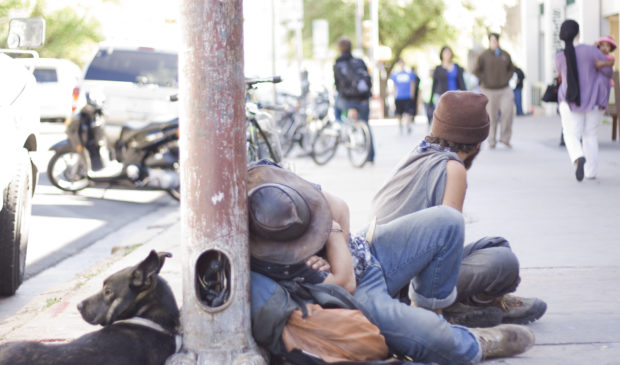Public Safety Commission talks homelessness with APD
Tuesday, October 8, 2019 by
Jessi Devenyns Last week brought a new level of scrutiny to the way the city polices individuals experiencing homelessness. The governor declared he would “unleash” state resources if Austin doesn’t address its homelessness issues by Nov. 1. Police Chief Brian Manley suggested reinstating the old ordinances while the department worked on its enforcement strategy. Finally, the police department released updated training bulletins for officers tasked with enforcing the new ordinances.
In an effort to understand just what the police department is dealing with in terms of enforcement, the Public Safety Commission discussed the new training bulletins at its Oct. 7 meeting.
Commission Chair Ed Scruggs noted that understanding the overall compliance with these new ordinances required a “fact-based discussion … because there is so much confusion and distortion out there.”
He said that although the updates to the ordinance were intended to be clarifications of the interpretation of the original ordinance to promote public safety, the topic has divided citizens and caused a “firestorm of misunderstanding and vitriol.”
The two portions of the ordinance that are causing such a stir deal with obstruction of sidewalks and camping in public spaces.
Officers are instructed in the police department’s new training bulletin to give notice of a violation before any action is taken. Violations can be broken up into two categories: blocking rights of way and endangering others.
According to Assistant Chief of Police Joseph Chacon, “In most cases, compliance happens and no enforcement is necessary.” At the same time, he specified that compliance is expected to be immediate once police officers inform an individual that he or she is in violation.
Still, officers give people a “reasonable” amount of time to comply. Reasonable, Chacon told the commission, is determined by an officer’s “common sense and good judgment.”
If an individual does not comply, enforcement action is taken, which he said in an interview is more often than not a ticket.
Enforcement is not a one-size-fits-all solution. Chacon told commissioners that the department relies on an officer to factor human compassion into their judgment about how to address each situation. In most cases, he said officers, especially those who patrol downtown, already operate in this manner. “They know their names, they know their circumstances … and they have compassion for these individuals,” he said.
An individual can be cited if a wheelchair, stroller or shopping cart obstructs pedestrians from using a sidewalk or passing normally. Passing normally means that a pedestrian is not required to zigzag around the object.
Officers can cite for endangering behavior under the camping ordinance if individuals are using upholstered furniture such as mattresses, armchairs or sofas in an outdoor space. “Those tend to become breeding grounds for lice and bedbugs and other types of health hazards,” explained Chacon. “We didn’t want that to become really prevalent in Austin.” To address that, the police are working with Health and Human Services as well as Austin Resource Recovery to remove upholstered items intended for indoor use from campsites.
Chacon told the Austin Monitor that the department is still working on coordinating with the other organizations to roll out that effort.
Most of the noncompliance issues are in the downtown area, according to Chacon, but the department is also looking to identify all the areas around the city with the greatest number of complaints.
Scruggs asked whether the new training bulletins were released in response to the governor’s letter to the mayor last week.
Chacon clarified that the updates were already in the works weeks before the letter arrived, and called the timing “unfortunate.” He explained that, at the end of the day, “We’re just making sure people aren’t violating (the ordinance).”
Photo by Danny Ozuna made available through a Creative Commons license.
The Austin Monitor’s work is made possible by donations from the community. Though our reporting covers donors from time to time, we are careful to keep business and editorial efforts separate while maintaining transparency. A complete list of donors is available here, and our code of ethics is explained here.
You're a community leader
And we’re honored you look to us for serious, in-depth news. You know a strong community needs local and dedicated watchdog reporting. We’re here for you and that won’t change. Now will you take the powerful next step and support our nonprofit news organization?



